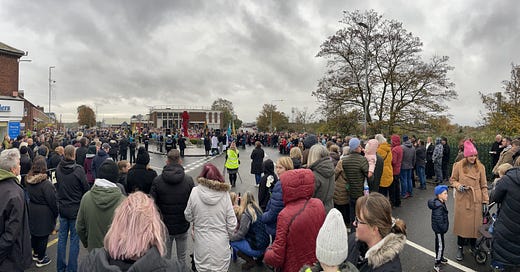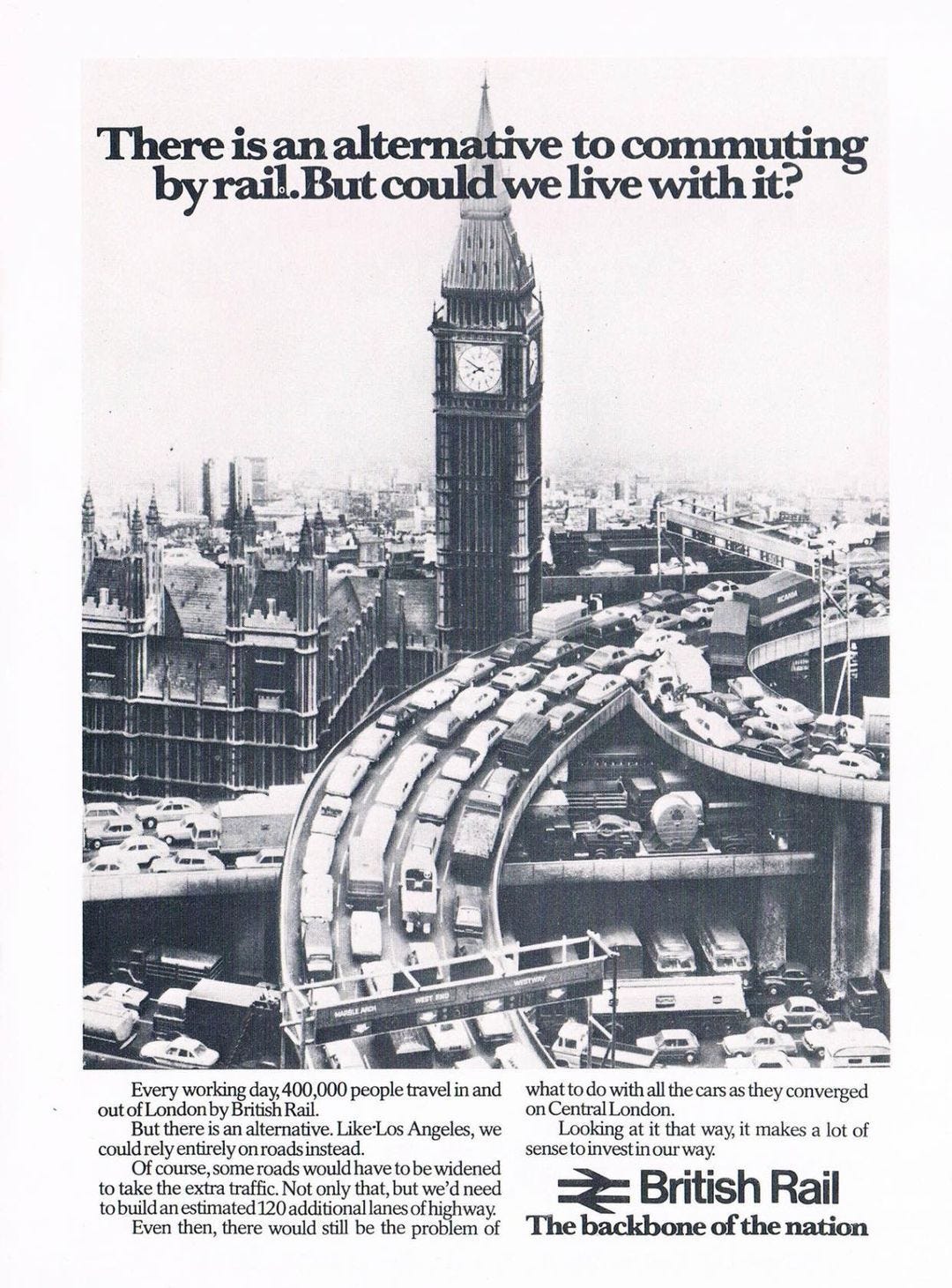🛞 Congestion Buster - MM#619
Good day my good friend.
This last weekend, the UK has been taking part in its annual festivities to celebrate the Armistice. For the last 3 years I have assisted in at the local event in Flitwick as part of my role as Town Councillor. Not only have I found talking to the veterans a very helpful antidote to the endless politicisation of what should be acts of remembrance, but also the road closures necessary for the parade gave an insight as to what our streets could be like were they not dominated by motor vehicles.
Maybe making the closures that we make every Remembrance weekend more permanent, especially in places where we remember those who gave the ultimate sacrifice for our way of life, will be a fitting legacy.
If you like this newsletter, please share it with someone else who you think will love it. I will love you forever if you do. ☺️
James
🚗 Road pricing may be socially just after all
An often-heated argument around road pricing is whether or not the impacts of any such scheme is socially just or not. People who favour road pricing point out how the poorest in society tend to use public transport more and drive less, and so long as the revenues raised are focussed on public transport then the impact is broadly positive.
However, those who oppose road user charging focus on the impacts on poorer drivers. It is known that those on low incomes without the ability to use public transport could be particularly badly affected by new charges. Much of the recent discussion around London’s Ultra Low Emission Zone has focussed specifically on the challenges that poorer drivers face in changing their vehicles to those compliant with the zone’s requirements.
In the public discussion, much is made about the impacts on people’s immediate bottom lines. For good reason. This effect even has a literal title: the Pain of Paying. Or simply, when making decisions people consider the immediate pain of paying more than their longer term benefits. When you are on a lower income, the immediate pain of paying an extra £10 a week when you are struggling to balance a budget is harder than the value of any time you will save.
The thing is, those savings do have value. And there is now evidence that suggests that poorer drivers benefit the most from charging schemes. Cody Cook and Pearl Li looked at the distributional effects across income groups of charging to use the I-405 Express Toll Lanes in Washington State, USA. What they found was very interesting indeed.
A key welfare channel is the option value of tolling: even drivers who infrequently take the priced lanes can benefit from having the option but not the obligation to pay for speed. The model is estimated using data on toll transactions, historical traffic conditions, and driver characteristics from the I-405 Express Toll Lanes in Washington State. Relative to a world in which the same number of highway lanes are all free, status-quo tolling increases aggregate welfare and benefits drivers in all income quartiles, driven in large part by the option value. Moreover, we find that drivers in the bottom income quartile gain the most under status-quo tolling.
To try and put this is some form of English, because low income drivers are more sensitive to price, and because their travel habits make them even more sensitive to price changes (in this case their commutes are longer as they are increasingly being priced out of cities), when they experience benefits they are relatively larger in value. Furthermore, when congestion happens, low income drivers pay the highest price for it relative to their income.
Lets expand this last example. Two cars are stuck in traffic. Both with the same fuel efficiency when idling. One driver has an income of £150,000, the other £20,000. Who is paying relatively more for the fuel burned when in that traffic? So if a road pricing scheme reduces congestion, the driver on the lower income benefits more.
It also reflects an interesting reality of much of urban living. As the lower income residents are priced out of cities, so they need to commute further. And while the richest travel further on average, it is this effect which means that those on lower incomes are likely to benefit more from road pricing.
As with all such research, it depends upon how you frame the question. If you ask the degree to which people are out of pocket from road pricing, then those on low incomes are likely to suffer adverse effects. But if you take account of both direct and indirect costs and benefits, then it would appear that those on the lowest incomes benefit the most even if they drive.
Road pricing is a policy idea for which the evidence of wider benefits is well-established, and maybe its time has come. It seems we can now add “its good for low income drivers” to its benefits.
What you can do: If you are a professional, then I highly recommend that you help your professional institution make the case for road pricing. For example. the Transport Planning Society Policy Group is always willing to accept contributions.
If you are an activist, maybe your local activist group is willing to support and call for a local road user charging - even increasing local parking charges? The views of some local authorities are variable, But groups like the Greater Cambridge Partnership and Clean Air for Bristol are examples of some of the more effective campaigns.
🎓 From academia
The clever clogs at our universities have published the following excellent research. Where you are unable to access the research, email the author - they may give you a copy of the research paper for free.
TL:DR - Events at home affect attitudes to specific modes over time, with men more likely to love cars.
TL:DR - Want people to use your automated vehicle? Make it easy to use.
TL:DR - Having better broadband connectivity could increase local population growth, but the relationship is a complicated one.
The impacts of ridesourcing services on the taxi market: Empirical evidence from England and Wales
TL:DR - Introducing Uber could reduce the number of traditional taxi services in an area, but the effect is highly variable.
✊ Awesome people doing awesome things
Something slightly parochial today. I am doing some work with Transport for the South East on their transport strategy at the moment. My good colleagues Sarah Valentine, Katie Lamb and Tia Shelley have been doing lots of awesome things for a while, but their latest podcast (along with Katie Stewart of Surrey County Council) on the experience of women in transport is just what you need to listen to. They articulate the barriers facing women, and the solutions we need to deploy, perfectly.
📼 On the (You)Tube
The transport industry is full of informal workers, whether it be ridesharing, deliveries, freight, ports, or anything else. They face economic problems outside of just being able to afford their bills. This video is an example of one of the many initiatives set up to try and help informal workers in America.
What you can do: Many trade unions are supporting the establishment of collective bargaining and co-operatives for informal workers. I know that trade union laws vary by different countries, so I recommend searching for how trade unions in your country are supporting informal workers, and seeing what you can do to help. And, at risk of being slightly political, you can do much worse than actually supporting a trade union.
🖼️ Graphic Design
British Rail did a lot of things badly. But its promotional material was not one of them. Thanks to Adam Tranter for re-sharing this classic poster of motorways across Central London. Maybe, we should do this kind of thing again (not the motorway building bit).
📚 Random things
These links are meant to make you think about the things that affect our world in transport, and not just think about transport itself. I hope that you enjoy them.
The Great Social Media–News Collapse (The Atlantic)
Befouling the Final Frontier (New York Times)
Sick city (aeon)
Generative AI Is Playing a Surprising Role in Israel-Hamas Disinformation (Wired)
✍️ Your feedback is essential
I want to make the calls to actions better. To do this, I need your feedback. Just fill in the 3 question survey form by clicking on the below button to provide me with quick feedback, that I can put into action. Thank you so much.




